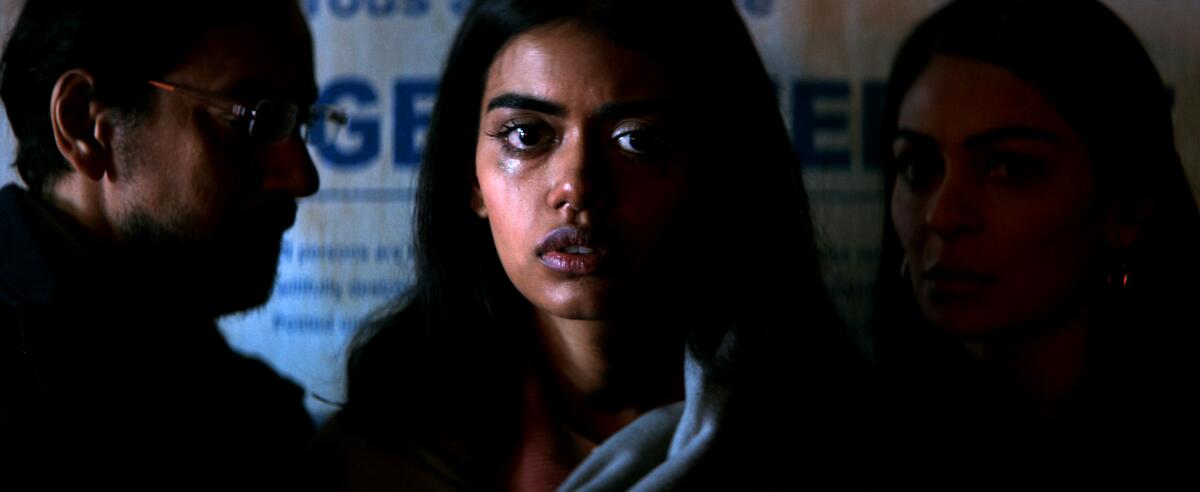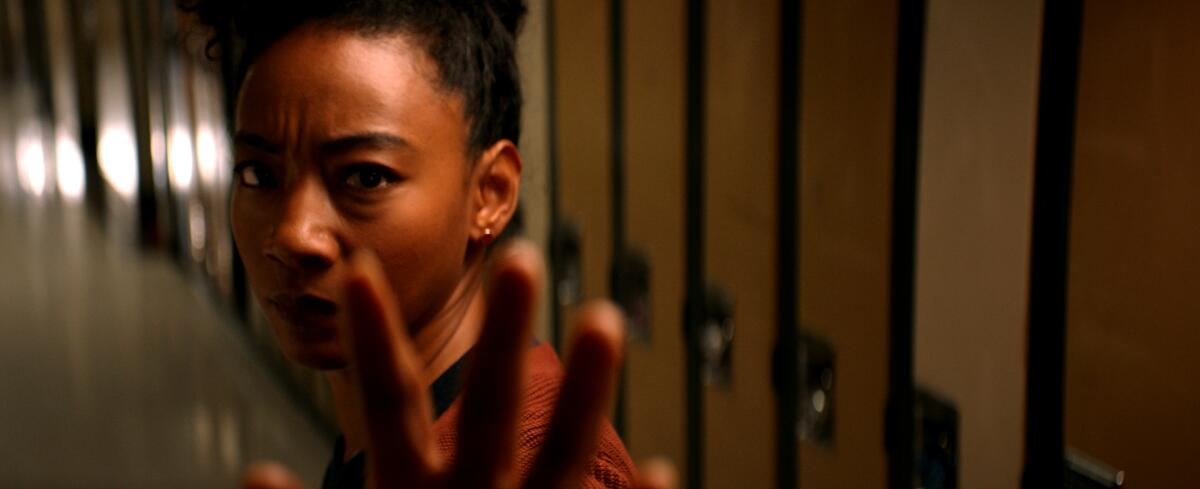Review: Metaphors cut deeper than scares in supernatural teen horror ‘It Lives Inside’

An invisible demon that feeds on bad vibes would make a buffet out of your average high school, but the monster of Bishal Dutta’s feature debut “It Lives Inside” is rooted in an even more specific and rarely depicted angst: the self-negating psychological horrors of an immigrant teen living in the mostly white suburbs.
Megan Suri (“Never Have I Ever”) stars as Samidha, an Indian American girl existing between two cultures in an unnamed North American town. Her morning ritual consists of shaving her arm hair and picking the right skin-lightening selfie filter before she heads to class, where she goes by “Sam” and pastes on a smile at the condescension of the popular white girls she calls her friends.
Her immigrant parents are of two minds: Dad Inesh (Vik Sahay) understands Sam’s desire to fit in, while her mother, Poorna (Neeru Bajwa), chides her for straying from their traditions and losing her Hindi language. Sam’s own choices are made plain during the film’s more interesting opening, when she opts for a classic teen bonfire hang with her white crush, Russ (Gage Marsh), over prepping for puja with her mom.
But Sam’s rejection of all she longs to erase also serves as the film’s inciting catastrophe when Tamira (Mohana Krishnan), the only other Indian girl at school, comes begging for her help. Once her BFF, now all unkempt hair and wild eyes, the loner clutches a Mason jar full of inky black gunk and chunks of raw meat in her backpack — the last kid Sam wants to be associated with else risk social suicide.
So smash goes the jar in a locker-room sequence that brings Sam’s ugliest fears to the fore, unleashing the ravenous supernatural force trapped inside. When Tamira goes missing, Sam becomes next in line to investigate and attempt to contain its horrors, placing her parents, love interest and sympathetic teacher Joyce (“Get Out”’s Betty Gabriel) in the sights of the unseeable fanged spirit.

Inventive shots and (literally) hair-raising set pieces occasionally rise above too-apparent budgetary constraints, even as Dutta relies too often on close-ups of his actors shivering in fear to evoke the terror of the boogeyman, revealed to be a pishach from Hindu folklore. But the director can’t resist a last-act turn that makes his bony, taloned demon physically manifest in ways that defy the film’s own undercooked logic.
All that really saves “It Lives Inside” from derivative storytelling beats cribbed from a thousand other horror movies is the cultural specificity of its monster (said to have followed another family to the West from India), as well as the means by which Sam must ultimately face it — by embracing the parts of herself she once sought to escape.
It feels personal when Dutta, who co-scripted the film with Ashish Mehta, pokes on the bruises of Sam’s internal battles: the struggle to be seen but not singled out, the dread of accepting self-deletion as the only way to survive. Proving her own star quality, a committed Suri guides Sam through a journey of identity and final-girl heroics that brings satisfying healing to her strained relationship with her mother.
If only the writing stuck the landing. Even as Sam, armed with a conveniently discovered leather-bound notebook of scribbled clues, Googles “significance of the number 7 in Hinduism” to piece the mystery together, the answer hardly factors, as the film hurtles toward its reckoning, shot in atmospheric shadows and crimsons.
But a note of ambiguity in its final moment — thanks to Suri’s ability to conjure warring layers in a glance — offers a parting provocation that suggests there can be no easy containment, no definitive vanquishing of the devils that reside within. It’s Dutta’s boldest stroke, and the one that truly leaves a lingering chill.
'It Lives Inside'
Rating: PG-13, for terror, violent content, bloody images, brief strong language and teen drug use
Running time: 1 hour, 40 minutes
Playing: In wide release
More to Read
Only good movies
Get the Indie Focus newsletter, Mark Olsen's weekly guide to the world of cinema.
You may occasionally receive promotional content from the Los Angeles Times.











